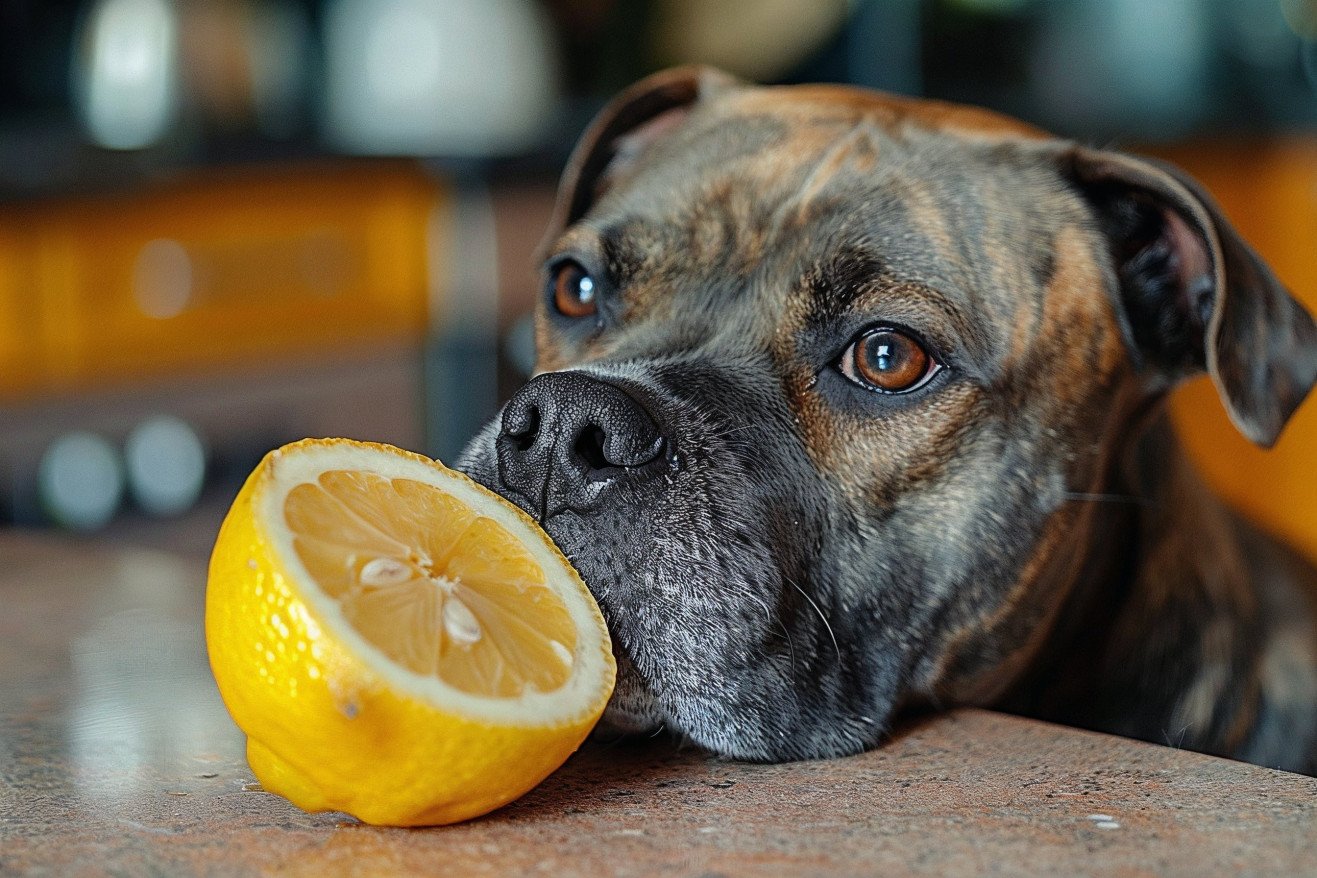Can Dogs Have Lemons? Citrus Dangers Explained
9 March 2024 • Updated 9 March 2024

While lemons are a popular way to add a little zest to a dish, can they be a healthy snack for your furry friend? Lemons are not recommended for dogs. They contain citric acid and psoralen, which can lead to digestive upset and potential toxicity. If a dog eats a lemon, they may exhibit signs of toxicity like vomiting, diarrhea, and depression. Instead, opt for dog-friendly fruits like apples or blueberries.
Our evidence-based analysis will look at veterinary opinions and toxicology studies to help you understand the dangers of feeding your dog lemons. We’ll also look at nutritional research to show you some healthy dietary options for your dog. With this information, you’ll be able to make the best choices for your dog’s diet and, in turn, their well-being and quality of life.
Can dogs have lemons?
Potential Risks of Lemons for Dogs
Not all fruits are safe for dogs to eat, and lemons are no exception. Lemons contain a number of compounds that are toxic to dogs, including citric acid, psoralen, limonene, and linalool.
While these compounds are found in a variety of plants and can even be beneficial to humans in some cases, they can be harmful to dogs. For example, a study in the Journal of Chemical Ecology found that limonene and linalool are both highly toxic when ingested by specific insects, suggesting that they may be toxic to other animals as well.
Dogs that eat lemons may experience symptoms like vomiting, diarrhea, and depression, all of which should be taken seriously by dog owners. The biological processes that cause these symptoms are related to cellular disruption and mucous membrane irritation. In fact, psoralen is phototoxic, meaning it causes damage when the animal is exposed to light, according to a study by Zuzana Siroka published in PMC.
If a dog eats lemons or lemon-containing products, it’s important that their owners act quickly. Owners should contact a veterinarian right away to determine the severity of the toxicity and the appropriate next steps.
While the occasional taste of a lemon slice may not be cause for concern, it’s the cumulative effect of these toxic compounds that can lead to more serious health issues. Dog owners should be aware of the early signs of lemon toxicity to prevent more serious health problems in their pets.
Citric Acid and Dogs
Citric acid, a natural preservative found in many fruits, has a dual impact on dogs. Although it is safe in small amounts, large amounts can lead to digestive issues and discomfort for dogs. A study by C A Hirshman on PubMed shows that dogs with hyperreactive airways can have their airways constrict when exposed to citric acid. This is a sign that they are sensitive to the compound.
The negative effects of citric acid are especially clear when looking at lemons. According to DoghouseFM, dogs can handle small amounts of citric acid, but large amounts can lead to digestive issues like vomiting and diarrhea. The site also notes that the acidity of citric acid can lead to the erosion of a dog’s tooth enamel if it is consumed in large amounts over time.
Dog owners should make sure that they don’t give their dogs more citric acid than the recommended amount, which is less than 30 mg per day per pound of body weight. Because lemons are high in citric acid, it’s important for dog owners to understand the potential health issues, including digestive problems, and to keep citrus fruits like lemons away from their dogs.
To make sure that their pets stay healthy, dog owners need to understand their dietary restrictions and avoid foods that can be harmful, including those that contain high levels of citric acid.
Healthful Bites: The Best Fruits to Feed Your Dog
While lemons are not a good option for your furry friend, there are plenty of fruits that are safe and can even be healthy in moderation. Forbes includes apples, bananas, and blueberries on its list of fruits that are safe for dogs and also offer vitamins, minerals, and hydration.
The vets interviewed by Forbes also explain that these fruits can provide a range of nutrients that can help with immunity, metabolic processes, and even weight control.
It’s important to stick to the ‘90–10 rule’—90% of your dog’s diet should come from their regular food, and treats, including fruits, should only account for 10% of their intake. This will help ensure that you’re feeding your dog fruits in moderation and that you’re maintaining a proper nutritional balance, which can be thrown off by too much fruit.
It’s also important to introduce fruits into your dog’s diet slowly so you can keep an eye out for any negative reactions. PetMD also suggests that you wash fruits and remove any parts that can’t be eaten, like seeds and stems, to prevent choking or poisoning. They also note that fruits like strawberries and pears should be cut into small pieces or mashed for smaller dogs.
It’s important to know what your dog’s nutritional needs are, and safe fruits can help you meet them. By making sure you choose the right fruits and portion sizes, you can make sure that you’re helping your dog stay healthy while avoiding the dangers of unhealthy treats like lemons.
How to Create a Healthy Diet for Your Dog: The Basics
A healthy diet is the foundation of good health for your pet. According to VCA Animal Hospitals, a healthy dog diet should include a combination of proteins, fats, carbohydrates, vitamins, and minerals.
While some fruits can be a good source of carbohydrates for your dog, it’s important to remember that dogs have different digestive systems and nutritional needs than humans. For example, lemons, which are safe for humans, contain compounds that are toxic to dogs.
WebMD explains that it’s important for dogs to have a diet that is complete and balanced. While fruits can be part of this, they should be in addition to the essential nutrients that dogs need.
The ASPCA adds that while treats, including fruits, can be part of a dog’s diet, they should make up no more than 10% of a dog’s daily calories, which means that the bulk of their diet should come from their regular food.
It’s important to talk to your vet before you add new foods like fruits to your dog’s diet. Your vet can offer personalized recommendations based on your dog’s specific health needs to make sure that their diet is promoting their overall health and avoiding harmful foods like lemons. By following expert advice and learning about the specific nutritional needs of our dogs, we can help ensure that they live long and healthy lives.
Final Thoughts: Protecting Your Dog’s Diet
As we’ve learned, lemons and dogs don’t mix. The citric acid and psoralen in lemons, while safe for people, can cause a range of problems for dogs, from digestive upset to toxicity. It’s important for dog owners to know the signs of trouble, like vomiting and diarrhea, and to understand the need to keep lemons and other citrus fruits away from their pets.
When it comes to finding the best diet for dogs, information is power. Knowing which fruits are safe and even beneficial can help ensure that a pet’s diet supports their well-being rather than putting them at risk. That’s why it’s so important for pet owners to carefully manage their dog’s diet and to consult with a vet before adding new foods to their routine.
In the end, let this serve as a call to action to make sure that we’re looking out for our dogs’ best interests by being mindful of what we feed them. By making sure that their diets are healthy, well-rounded, and free of dangerous substances like lemons, we can help them live long, healthy, and happy lives.


